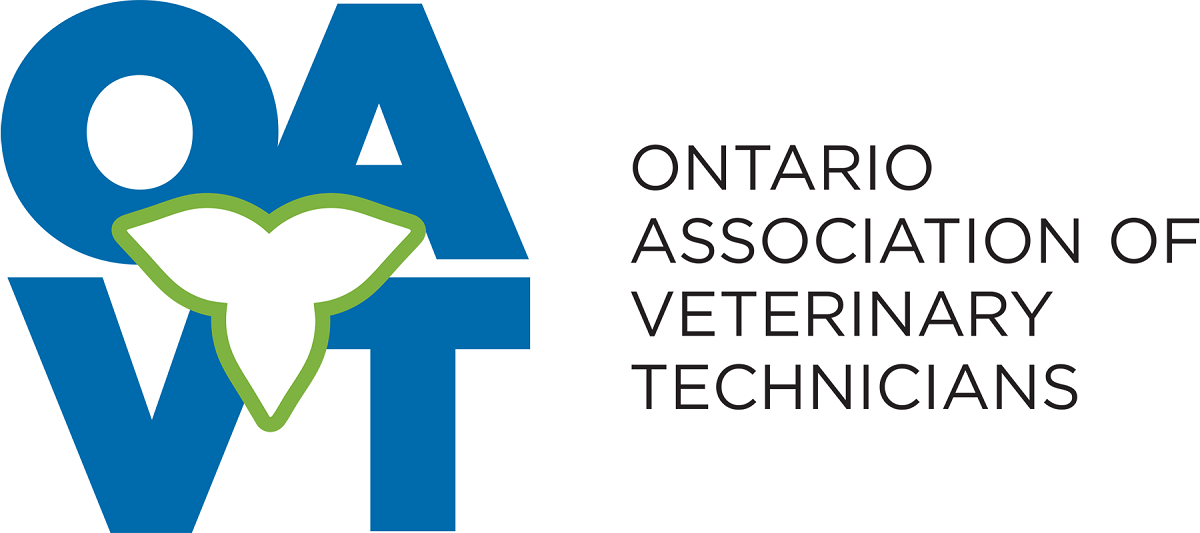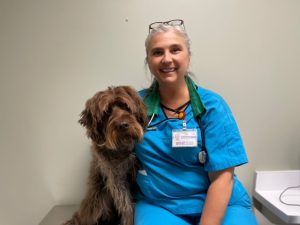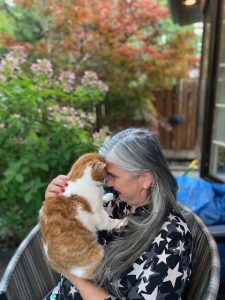Myroslava Tyzkyj BA, RVT, RP
Where did you go to school and what made you decide to take a Veterinary Technology program?
I attended the 3-year program at College Vanier in Montreal. I had wanted to be a veterinarian as a child but as a teenage animal right activist, I refused to dissect animals in science class in high school. My teacher told me I could never be a vet if I didn’t do that and I believed him so I stopped taking science classes and never tried. In my mid 20’s I had a friend who worked at a small animal practice who took me on a tour of her work one day when she found out I had wanted to be a vet. This is where I discovered that veterinary nurses (that’s what they called it) even existed. I had never heard of veterinary technicians before. I thought it was the coolest job ever. I loved how hands-on the technicians got to be with the pets from the first physical exam to recovering them from anesthesia and sending them home.
What is your current job(s)?
I currently work part-time in the dentistry department at the Veterinary Emergency Clinic in downtown Toronto. The rest of the time I am building my practice as a psychotherapist with Redbird Therapy (www.redbirdtherapy.ca)
What specific tools or advice would share with someone as they enter the RVT profession?
I think the most important thing for someone entering the field right now is to think about work/life balance. I know it’s tough in the beginning because right out of school you feel so inadequate, you want to learn everything and prove yourself, and most of all you want to help people provide the best life for their animals. What we’re not taught is that if you’re not strong and resilient, you won’t be able to give your all, so it’s beneficial to your patients to have boundaries and to speak up when you’re not feeling comfortable. I encourage RVTs to think about what work/life balance could mean to them.
If you could encourage other RVTs to focus on ONE thing about the profession to celebrate, what would it be?
The animals of course! The animals are the best part of the job and being able to help them when they’re suffering, whatever that means, is so rewarding. Educating their caretakers on how to offer their beloved pets the best, most comfortable life they can is so important. This can improve the human/animal bond and empower caretakers to do the best they can for their pets. And there’s nothing like reuniting a pet with their caretaker after a day or weeks in hospital when they’re both so happy to see each other!
What other jobs have you had in the RVT field?
I’ve only ever worked in small animal practice. I worked in 2 different small animal practices in Montreal and when I moved to Toronto almost 20 years ago, I started working at VEC and I have been there ever since.
Tell us about your career path and how one role helped open doors for another role. Was it scary making a change? What advice can you give other RVTs who may “want a change” and they just don’t know how to turn it into a reality?
There was a time I was struggling emotionally being a Registered Veterinary Technician. I didn’t have a resilient mindset to weather the difficulties that go along with working in such a fast-paced, and at times, emotionally charged environment. Working in a referral/emergency hospital can be unbelievably demanding and I struggled with boundaries. I found it hard to advocate for myself when I needed to. Attending therapy myself and learning how my history affected the way that I reacted to my work environment helped me to find compassion for myself. Through therapy, I got to know and accept myself for who I am. This acceptance is what encouraged me to pursue psychotherapy studies and ultimately helped me to decide to shift my career path toward being a psychotherapist.
It was a really scary decision to make because I had been an RVT for over 20 years. I went to veterinary technology school in my late 20s and I believed this was going to be the job I would retire from. On the one hand, I love medicine and working with animals so much – it’s so rewarding – but on the other hand the culture and working conditions were an aspect that I continued to struggle with even after coming to terms with who I am. Gaining some self-confidence made it more difficult to stay in some ways. I’m lucky because I’m in a position where I am making the change slowly and that is helping to make it less scary.
The advice I would give another RVT who wants a change is to consider what a meaningful life looks like for you. Some people thrive on having work be the centre of their lives, for others work is something else. One isn’t better than the other, you just have to understand what work means to you and what kind of life you would like to have. Once you’ve done that and you have an idea about your potential next steps, I would suggest talking to someone else who is doing the same thing you’re interested in. You can buy them lunch and pick their brains about how they got to where they are. More importantly, don’t keep your dreams to yourself! It’s so easy to convince yourself your dreams are unattainable when they live alone in your head. Share them with other people, and make yourself accountable to someone you trust. And take little kitten steps if you need to. You only need to do as much as you can.
What are your goals as an RVT? Not just your immediate goals, but long-term goals.
My short-term goals are definitely to help other RVTs who love this job and can’t imagine doing anything else find ways to thrive. My long-term goals are to empower RVTs to stand up for fair working conditions and to hopefully have some kind of part in making this job more sustainable.
RVTs are passionate people, and every RVT has an area they are most passionate about (nutrition, research, spay/neuter, dog bite prevention, education, etc.). What is YOUR passion?
I’m quite passionate about the Fear Free approach. I’m so excited that someone had this idea and ran with it and now the emotional experience of animals in a clinic is another aspect of their lives that we get to take care of.


